#include <stdio.h> #include <stdlib.h> #define N 4 int main() { int x[N] = {1, 9, 8, 4}; int i; int *p; for(i=0; i<N; ++i) printf("%d", x[i]); printf("\n"); for(p=x; p<x+N; ++p) printf("%d", *p); printf("\n"); p = x; for(i=0; i<N; ++i) printf("%d", *(p+i)); printf("\n"); p = x; for(i=0; i<N; ++i) printf("%d", p[i]); printf("\n"); system("pause"); }
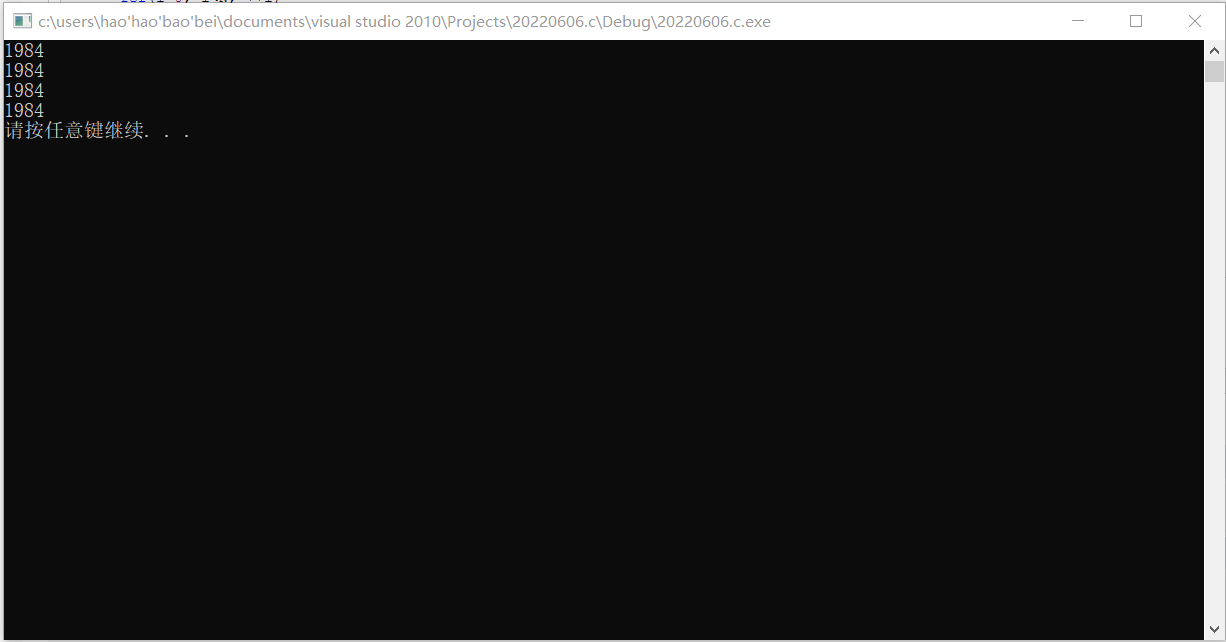
#include <stdio.h> #include <stdlib.h> #define N 4 int main() { char x[N] = {'1', '9', '8', '4'}; int i; char *p; for(i=0; i<N; ++i) printf("%c", x[i]); printf("\n"); for(p=x; p<x+N; ++p) printf("%c", *p); printf("\n"); p = x; for(i=0; i<N; ++i) printf("%c", *(p+i)); printf("\n"); p = x; for(i=0; i<N; ++i) printf("%c", p[i]); printf("\n"); system("pause"); return 0; }
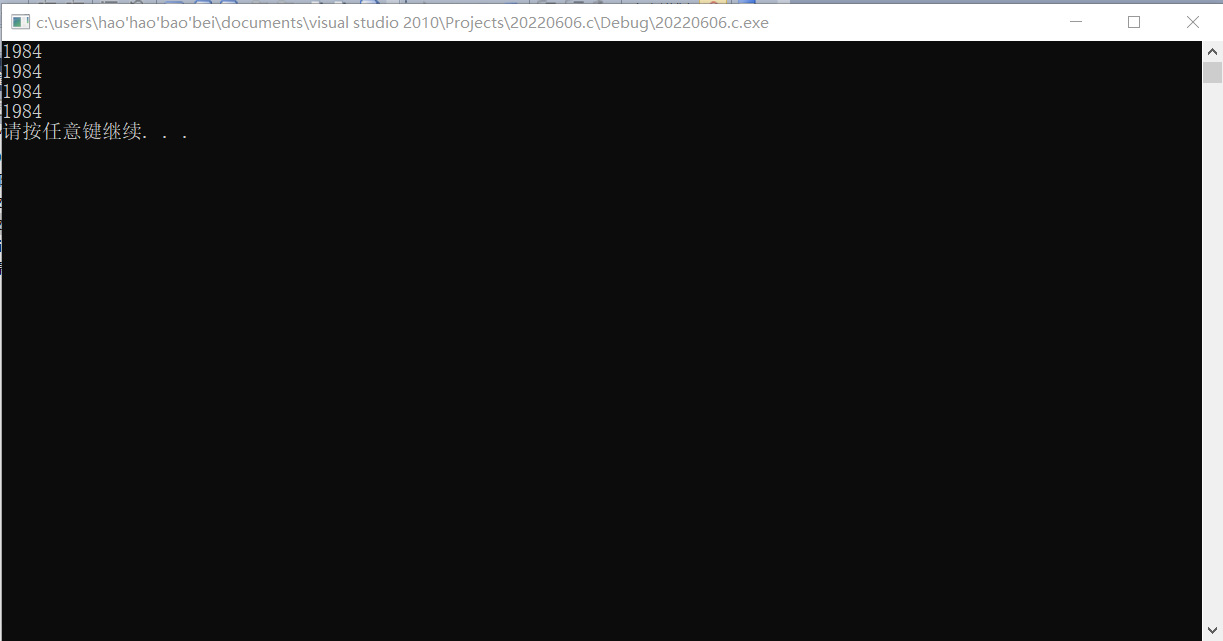
2004
2001
int型指针变量占四个字节的内存单元
char型指针变量占一个字节的内存单元
#include <stdio.h> #include <stdlib.h> int main() { int x[2][4] = { {1,9,8,4}, {2,0,2,2}} ; int i, j; int *p; int (*q)[4]; for(i=0; i<2; ++i) { for(j=0; j<4; ++j) printf("%d", x[i][j]); printf("\n"); } for(p = &x[0][0], i = 0; p < &x[0][0] + 8; ++p, ++i) { printf("%d", *p); if( (i+1)%4 == 0) printf("\n"); } for(q=x; q<x+2; ++q) { for(j=0; j<4; ++j) printf("%d", *(*q+j)); printf("\n"); } system("pause"); }
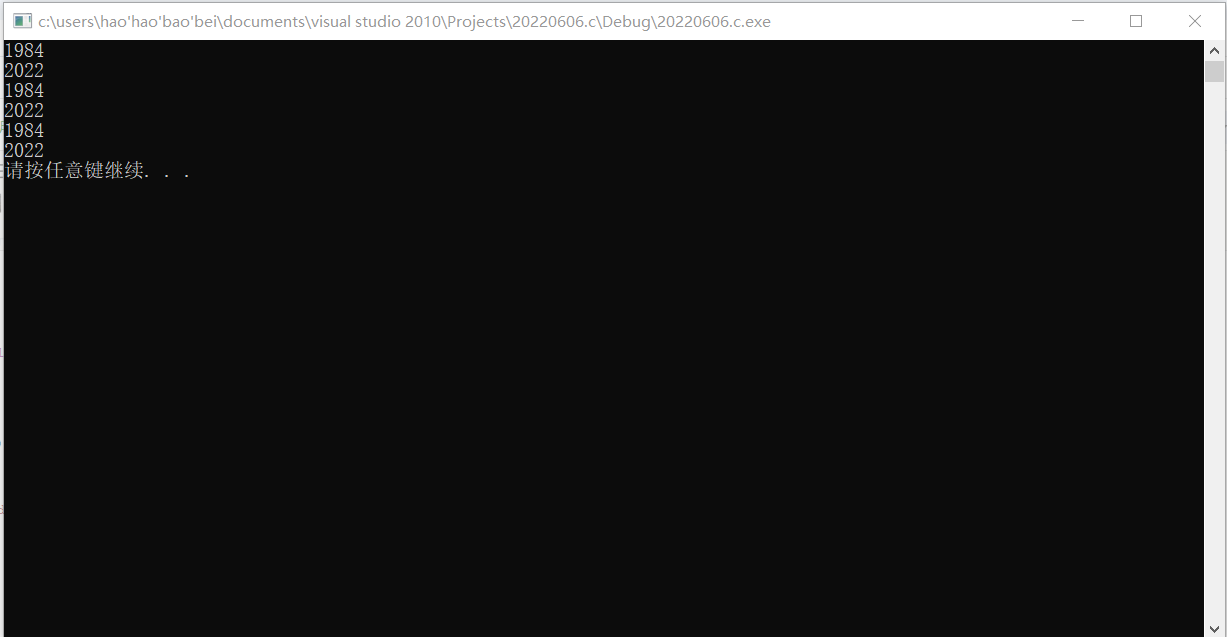
#include <stdio.h> #include <stdlib.h> int main() { char x[2][4] = { {'1', '9', '8', '4'}, {'2', '0', '2', '2'} }; int i, j; char *p; char (*q)[4]; for(i=0; i<2; ++i) { for(j=0; j<4; ++j) printf("%c", x[i][j]); printf("\n"); } for(p = &x[0][0], i = 0; p < &x[0][0] + 8; ++p, ++i) { printf("%c", *p); if( (i+1)%4 == 0) printf("\n"); } for(q=x; q<x+2; ++q) { for(j=0; j<4; ++j) printf("%c", *(*q+j)); printf("\n"); } system("pause"); }
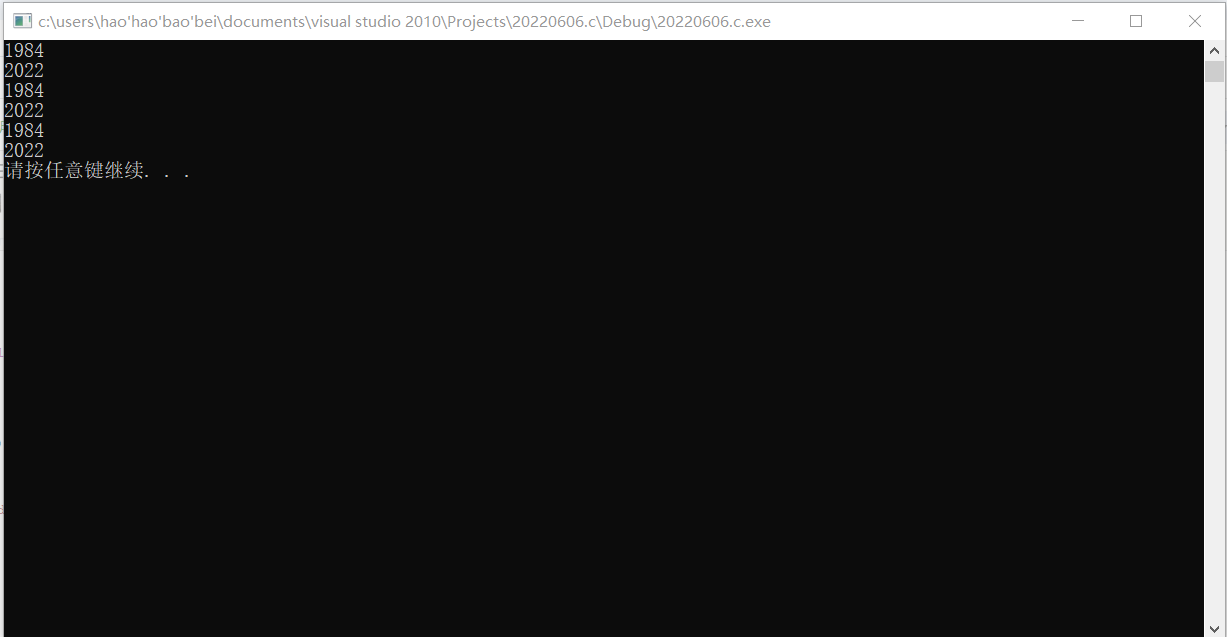
2004 2016
2001 2004
p指向的是二维数组元素的指针变量
q是指向一维数组的指针变量
#include <stdio.h> #include <string.h> #define N 80 int main() { char s1[] = "C, I love u."; char s2[] = "C, I hate u."; char tmp[N]; printf("sizeof(s1) vs. strlen(s1): \n"); printf("sizeof(s1) = %d\n", sizeof(s1)); printf("strlen(s1) = %d\n", strlen(s1)); printf("\nbefore swap: \n"); printf("s1: %s\n", s1); printf("s2: %s\n", s2); printf("\nswapping...\n"); strcpy(tmp, s1); strcpy(s1, s2); strcpy(s2, tmp); printf("\nafter swap: \n"); printf("s1: %s\n", s1); printf("s2: %s\n", s2); system("pause"); }
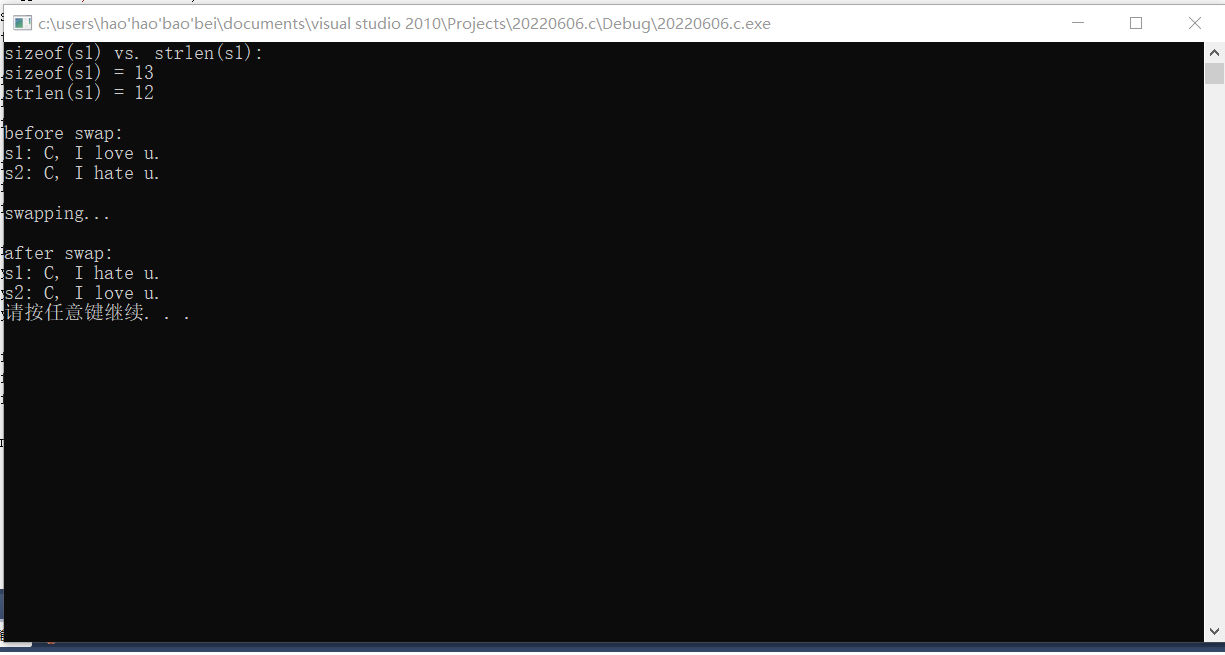
#include <stdio.h> #include <string.h> #include <stdlib.h> #define N 80 int main() { char *s1 = "C, I love u."; char *s2 = "C, I hate u."; char *tmp; printf("sizeof(s1) vs. strlen(s1): \n"); printf("sizeof(s1) = %d\n", sizeof(s1)); printf("strlen(s1) = %d\n", strlen(s1)); printf("\nbefore swap: \n"); printf("s1: %s\n", s1); printf("s2: %s\n", s2); printf("\nswapping...\n"); tmp = s1; s1 = s2; s2 = tmp; printf("\nafter swap: \n"); printf("s1: %s\n", s1); printf("s2: %s\n", s2); system("pause"); }
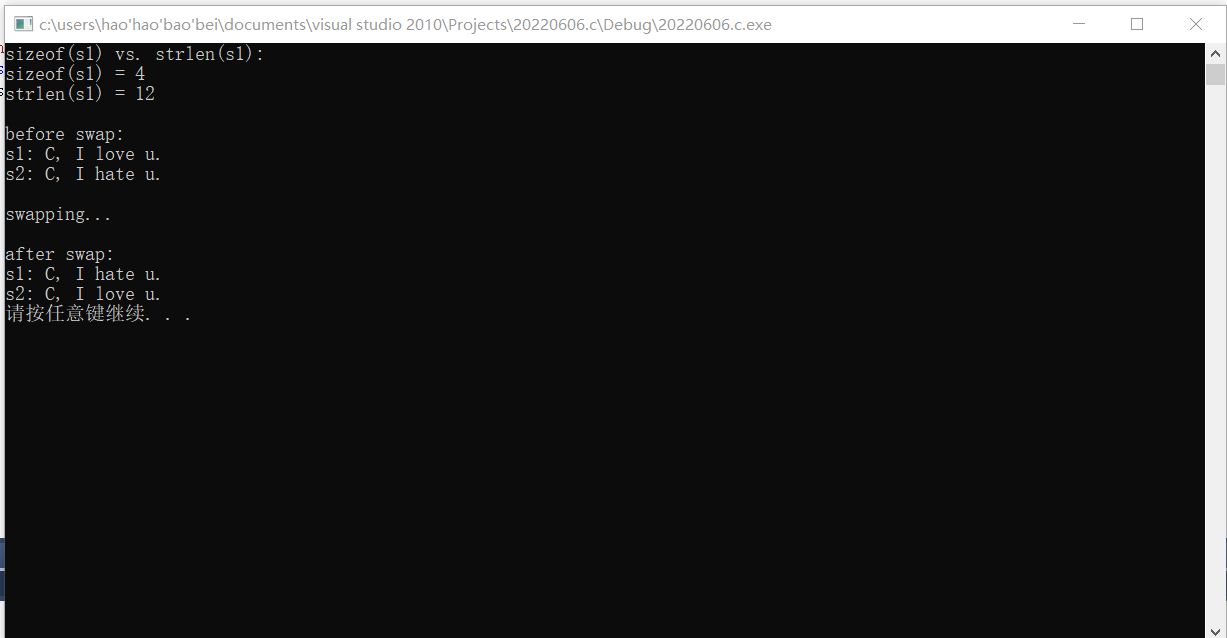
#include <stdio.h> #include <stdlib.h> #include <string.h> int check_id(char *str); #define N 5 int main() { char *pid[N] = {"31010120000721656X", "330106199609203301", "53010220051126571", "510104199211197977", "53010220051126133Y"}; int i; for(i=0; i<N; ++i) if( check_id(pid[i]) ) printf("%s\tTrue\n", pid[i]); else printf("%s\tFalse\n", pid[i]); system("pause"); } int check_id(char *str) { int i=0,j,flag=1; int n=strlen(str); if(n!=18) flag=0; else {for(i=0;i<17;i++) { if(str[i]>='0'&&str[i]<='9') i++; } if(i=16) { if(str[17]=='X') flag=1; else if(str[17]>='0'&&str[17]<='9') flag=1; else flag=0; } } return flag; }
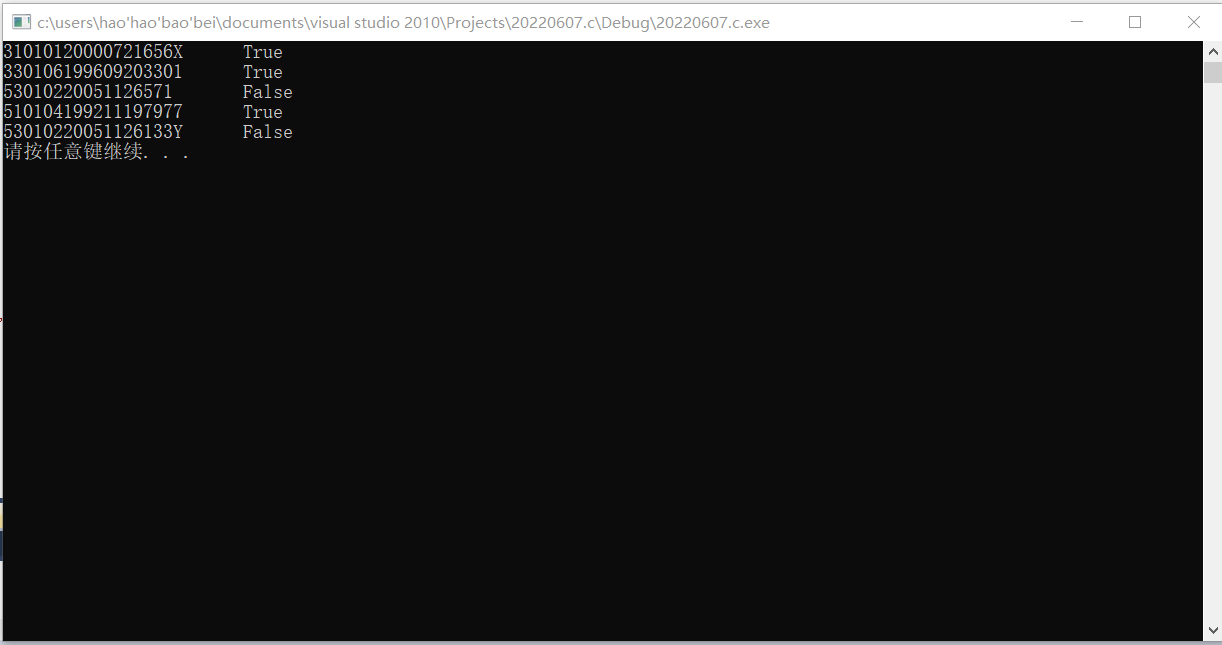
#include <stdio.h> #include <string.h> #include <stdlib.h> #define N 80 int is_palindrome(char *s); int main() { char str[N]; int flag; printf("Enter a string:\n"); gets(str); flag = is_palindrome(str); if (flag) printf("YES\n"); else printf("NO\n"); system("pause"); } int is_palindrome(char *s) { int i,flag=1; int n=strlen(s)-1; for(i=0;i<n/2;i++) { if(s[i]!=s[n-i]) { flag=0; break; } } return flag; }
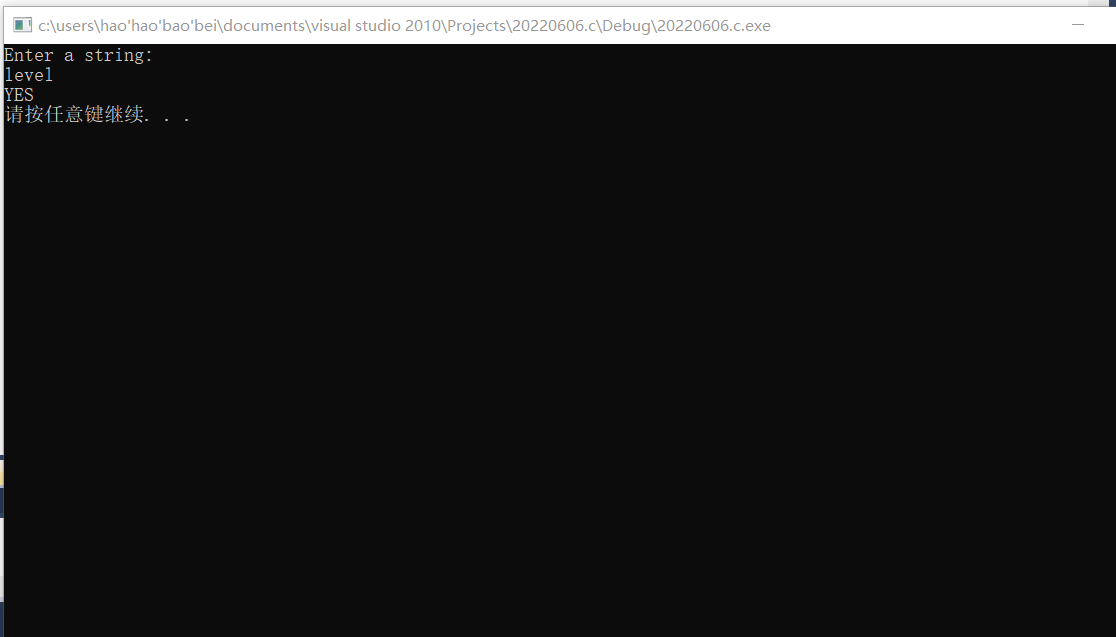
#include <stdio.h> #include <stdlib.h> #define N 80 void encoder(char *s); void decoder(char *s); int main() { char words[N]; printf("请输入文本"); gets(words); printf("编码后的英文文本"); encoder(words); printf("%s\n",words); printf("对编码后的英文文本解码"); decoder(words); printf("%s\n",words); system("pause"); } void encoder(char*s) { int i=0,n; while(s[i]) { i++;} n=i; for(i=0;i<n;i++) { if((s[i]>='a'&&s[i]<='y')||(s[i]>='A'&&s[i]<='Y')) s[i]=s[i]+1; else if(s[i]=='z') s[i]='a'; else if(s[i]=='Z') s[i]='A'; }} void decoder(char*s) { int i=0,n; while(s[i]) { i++;} n=i; for(i=0;i<n;i++) { if((s[i]>'a'&&s[i]<='z')||(s[i]>'A'&&s[i]<='Z')) s[i]=s[i]-1; else if(s[i]=='a') s[i]='z'; else if(s[i]=='A') s[i]='Z'; } }
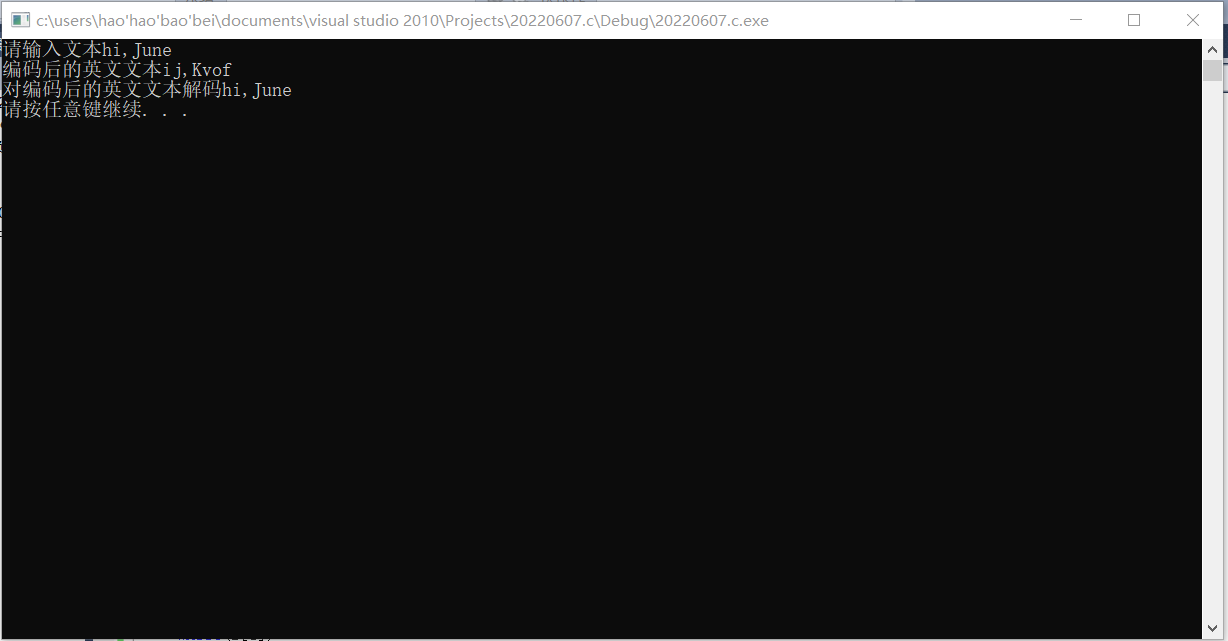




 浙公网安备 33010602011771号
浙公网安备 33010602011771号